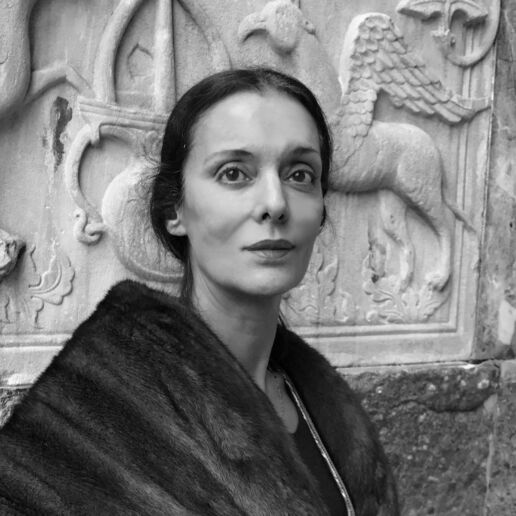ASLI TUNCA
The striking four-storey building that features period high ceilings, a curved handcrafted staircase, an assortment of marble, oak and Byzantine stone materials and a grand iron door which opens up to the garden, Hazz really does justice to its name which would translate as ‘pleasure’. Aslı Tunca stumbled upon the building 2 decades ago and following some detailed restoration work carried out in collaboration with her husband, it is now a showroom for period antique furniture and custom designs. Its walls decorated with gilded mirrors and contemporary paintings by important figures like Ismail Acar have been the backdrop for numerous celebrative events over the years. Can’t blame regulars for calling this place ‘Aslı Tunca House’ since one floor of the four-room hotel conversion also acts as Aslı Tunca’s home and office. It must be priceless to own a small world of your own in the heart of Istanbul.
Reminiscing
The first topic of our sincere conversation with Aslı Tunca takes us to a time when Istanbul was entirely different. “I remember my childhood and the times my mother and I went to Beyoğlu. We’d both wear gloves, my mother would also wear a hat. Until I reached 18, I remember everyone knowing each other by their name.” Her elegant style does remind me of French women however, I can sense her passion and longing for old Istanbul in every word she says.
“Mother always said I was the child of the revolution.” The revolution and course of life took her mother from Izmir to Istanbul and her father to Yassıada along with a few relatives. Raised by her mother and grandmother in Istanbul, Aslı Tunca went to the Italian High School before getting a degree in fashion in Paris.
Although Aslı Tunca started her career in fashion design, her acquaintance with antiques started at an earlier age. Her grandfather and aunt were collectors and exposure to antique items from childhood led her to start purchasing objects. “The fact that objects I have included in my life have a past that involved plenty of care and attention has always fascinated and excited me.” This is bound to be one of the most emotional narratives I have heard from an antiques collector until now.
Aslı Tunca lives abroad most of the time. Recently, she has been busy with the design and renovations of the house/flat they purchased in Paris. We met up with her as she was busy preparing to return to the world of fashion design with a bag collection after an interval of 23 years. She came to Istanbul precisely with this on her mind however, she has been housebound and unable to return to France since December after breaking her leg. With the Covid Lockdown in place, she decided to focus on handmade models which don’t require a sewing machine. Accompanied by a group of women huddled around her bed, she is making most of a period of jovial creativity.
“I’ve never believed in selling at high prices. I intrinsically believe in permanent and timeless pieces, those that you never seem to find the heart to get rid of.” This explains why she has always preferred to do freelance jobs and make ends meet independently rather than working with prominent fashion houses.
“It was a time when I was still in the fashion business yet antiques had become my biggest hobby. I was on the hunt for antiques for my home. I switched to antiques professionally after realising that objects and accessories were available but not premium furniture.” She met her husband-to-be Carl Vercauteren as she was trying to import antiques from Belgium. Actually, they never planned to work together. That happened in due course, after sculptor and furniture design enthusiast Carl moved to Istanbul and the couple realised a lot in their respective professions overlapped. In the years that followed, they have mostly been busy with procuring antiques for their customers as well as producing contemporary furniture and interior design projects.
Talking about what antiques mean to Aslı Tunca, it dawns on me once more what a refined woman she actually is. For her, possessing antiques is more like establishing relations with their former owners. Yet, there are cases when the customer likes the piece of furniture with feelings of discomfort knowing that it is old. Sometimes, customers can be after impossible items, among which are displayed in museums. She points out to the fact they provide original, period designs in these words; “We never opposed the idea of designing furniture as a master craftsman from that period would do and make a reproduction that is loyal to the techniques of the time.”
Transformation
“As usual, transforming this building into a hotel was an instinctive process. In developing the project, I imagined myself travelling through different countries and remembered my desire to experience unique and traditional details at the places I visited. I remember being disappointed on my arrival in China after being welcomed with conventional hospitality when I was excitedly expecting paddy fields and tree houses. It was the dark streets of Beijing where I found the traditionalism I was looking for. The moment was when a Chinese artist in her robe opened the huge red door of her house and welcomed us with a big smile. This is precisely the feeling I want to give people in Hazz Istanbul. A welcoming atmosphere associated with the old Istanbul. Another defining idea in developing the concept was refraining from doing anything that I would dislike being done to myself. No one staying at a hotel wants to pay extra money for water, soft drinks or breakfast. I asked myself what harm could come from not charging customers for services that do not cost that much. My decision attracted an elite customer portfolio before the first month was over.”
The same question spins around in my head while I listen to her. There must be up and downsides of getting to know multiple disciplines which are close but nonetheless different. “The biggest downside is the inability to focus. Another one is the yearning to move on to something else just as I start to actually earn from my venture. It’s a been there done that thing. So be it, your life is never monotonous.”
Style must leave its mark
Aslı Tunca has a soft spot for anything beautiful whether it be buildings, places, gardens, plants, fabric or jewellery… “Ultimately all of them complement each other. You must have your own style which you should pursue for the rest of your life. I remember being overwhelmed by this feeling when I was buying deteriorated and old items in the depot of a family. A superior quality Bouelle bedroom suite, an amazing Indian shawl and, inside a dusty draw, a seasoned passport that must have gone halfway around the world… It was the passport that impressed me the most. I did some research and found out that the family was very respectable. The items I recovered was enough to confirm the elegance of this family. This is what I’m trying to say, style must leave its mark.”
“Frequent visits to museums is the best way to get a feel for recognising valuable pieces,” says Aslı Tunca who believes that a trained eye is the only way to distinguish valuable items from reproductions in the rapidly changing and repetitive fashion cycle.
Inspirations
“I will first tell you a name from the past: Mariano Fortuny. He is someone who really inspires me. His Venice home, the decoration, the furniture, the paintings, the objects and everything he created is an amazing source of inspiration for me. From our time, I can mention our neighbour in Paris, James Thiérrée. I find it really precious that his family, who were also artists, were the first company to establish a circus without animals. Thiérrée often popped in during the renovation of our home. Our homes are completely different and we are both strong characters but we seem to come up with infinite recommendations for each other. I think the biggest compliment I got from him was, “Please let me know first if you ever decide to sell your home.”
While the Covid-19 pandemic has made the whole world go digital, the idea of buying online without seeing or feeling can only be plausible for Aslı Tunca if it is a design object.
“I can’t say the same thing for antiques due to the possible repairs made on these items. You’d like to see and feel the object if you are prepared to pay a substantial amount for it.”
Lastly, I ask a question to Aslı Tunca which I have been asking myself for a while now. What kind of a future can we expect after this ordeal? “I hope for a world which we pollute less and show more respect for other forms of life. In terms of design and art, I think we have to distance ourselves from hastily made items which we quickly consume and seek more of. I would like to see the fashion industry focus on properly made products rather than waste energy on seasonal and concept collections like winter, summer, capsule etc.”


